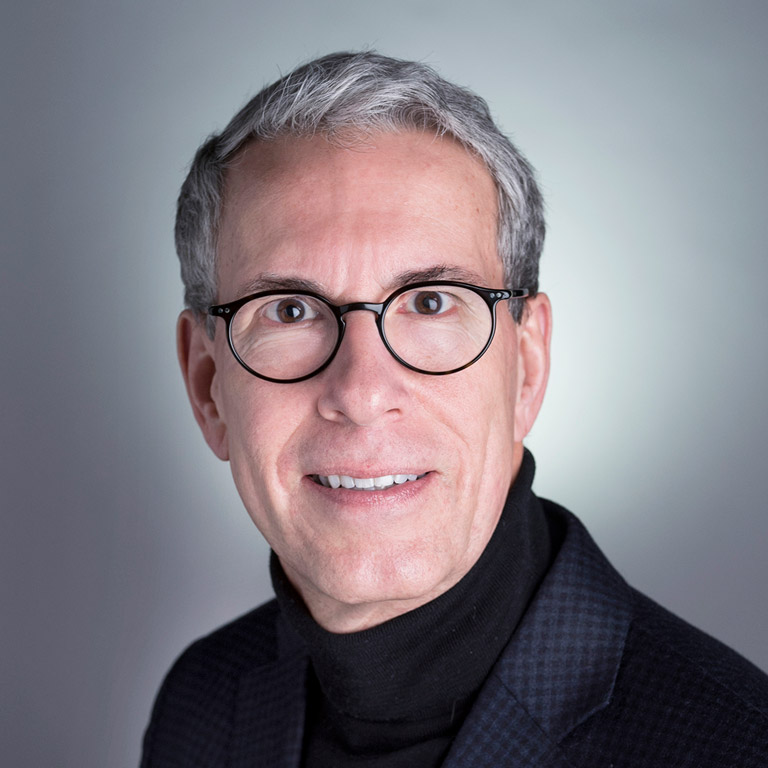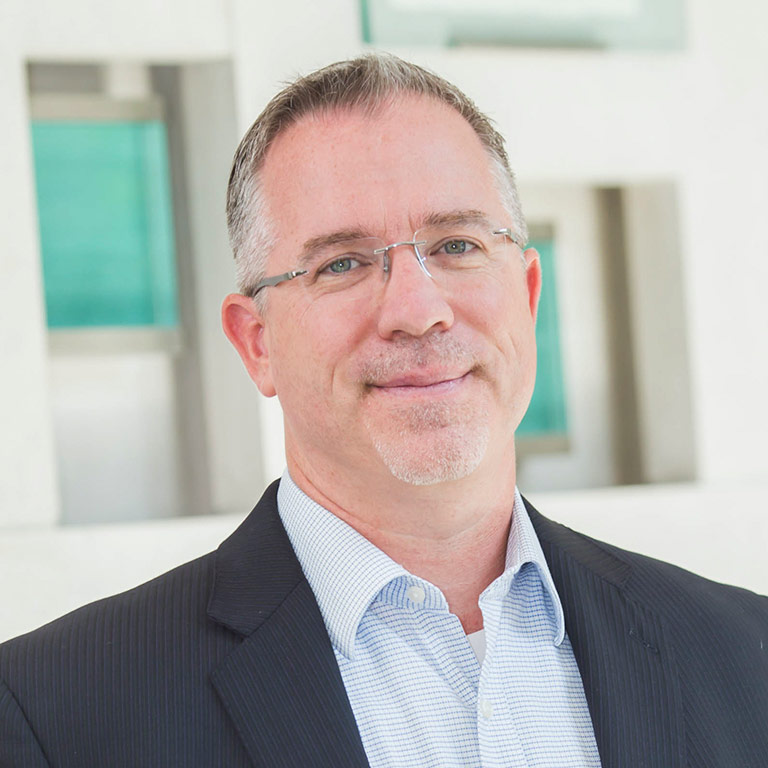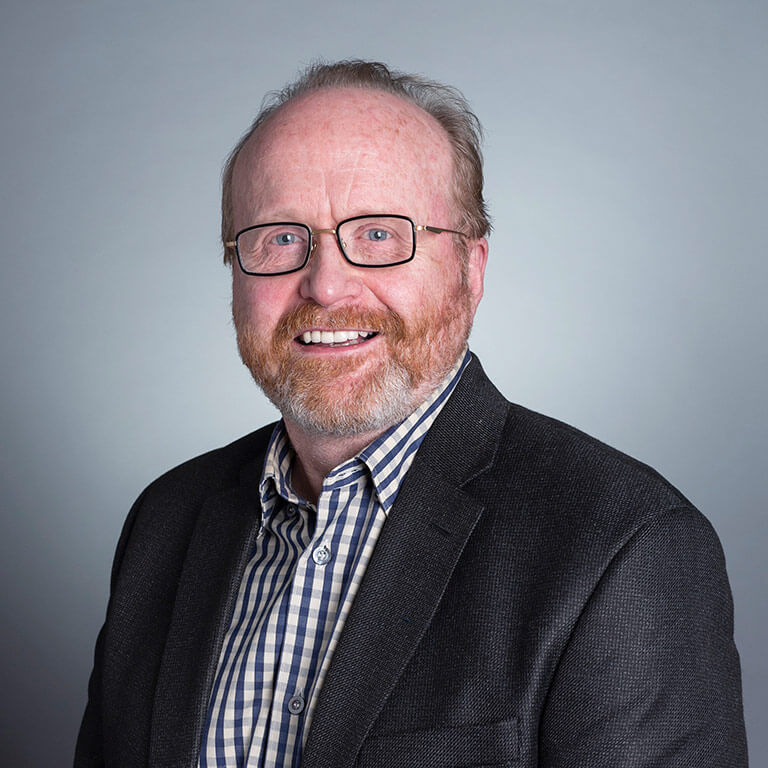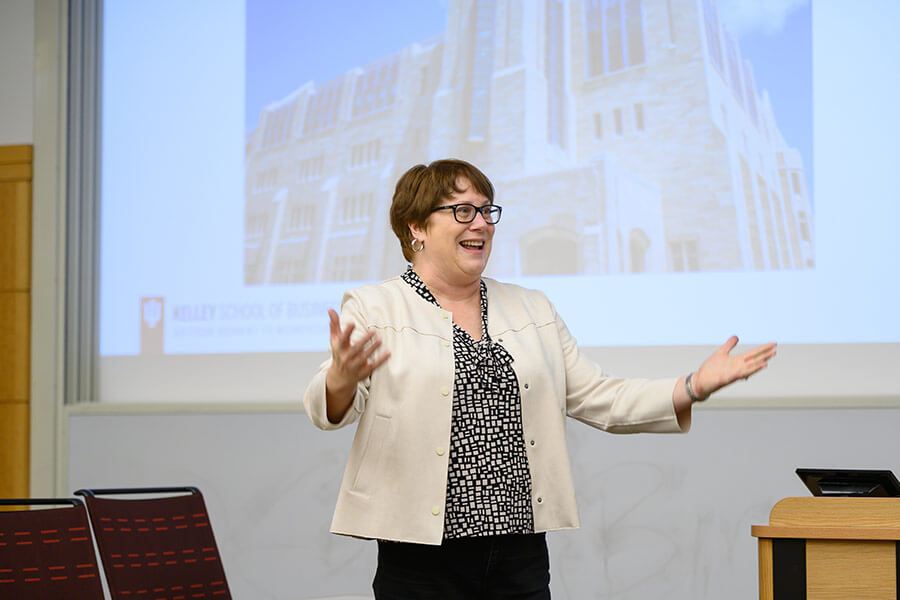While other online MBA programs rely on adjuncts to teach online courses, ours are taught by full-time Kelley School of Business faculty right from our Bloomington, Indiana campus. That means you get the same commitment from the same brilliant minds who teach in our in-person graduate programs. No catches and no compromises.
May 1
Learn with immersive and engaging online instruction
The Brian D. Jellison Studio Classroom and Studios, newly constructed for the Kelley School of Business in 2022, empowers faculty with the latest cutting-edge technologies for online teaching. Faculty can bring online classes to life in a variety of ways, from live classroom instruction to recorded 3D learning experiences, with the support of a team of experienced filmmakers and technologists.
Description of the video:
Music
Zach Watt, Production Coordinator, Jellison Studios, Kelley School of Business: The way we learn has changed. Rather than being limited to a classroom, students are now able to learn from anywhere in the world. And in a dispersed online environment, the relationships between instructors and students are more important than ever. Closing the distance between online learners and faculty increases the effectiveness of learning and empowers students to change the world wherever they may be.
At the Kelley School of Business, we use media to close that gap and give every student, no matter where they are, a genuine connection to their instructors, their peers, corporate leaders, and the IU community.
The new Jellison Family Studios provide Kelley faculty with the best technology available to create authentic, genuine connections with students. Whether it’s with pre-recorded video with insightful graphics and animations to make difficult concepts easier to grasp. Or synchronous online courses that ensure every student feels included and heard via a truly shared space with their instructors and peers.
Or utilizing immersive virtual environments to place instructors wherever they choose whether that be a location here on IU’s campus or businesses around the world. Thanks to the generous gift from the Jellison family, the Kelley School of Business is ready to set new standards in education and to help our incredible students be prepared for an even more incredible future.
Camera whirring noise
From the Brian D. Jellison Studios at the Kelley School of Business
Connect in live weekly classes
Every week, you’ll have the opportunity to learn, ask questions, and join discussions in real time with live classes taught by full-time faculty. Each course includes a weekly live class held between 6 and 9 p.m. Eastern Time. All live classes are recorded so you can reference them later.

“I love working with Kelley Direct students—their experience, their enthusiasm. They inspire me in every class session, knowing that they come in after working all day long and juggling home and family and travel. It just is so wonderful to be able to work with such an inspiring group, and they always bring it, and I just love that.”
Dan SmithProfessor of Marketing and Former Kelley Dean (2005 to 2012)

“The suite with which we prepare all of the materials that students experience in Kelley Direct is just as good as what we cover in any traditional classroom setting. We've taken away the barrier of geography and opened up the education we provide here at Kelley to many.”
Ray LutherClinical Assistant Professor of Management
Make your MBA your own
With 125 full-time faculty—more than any other online MBA program—teaching online MBA courses at Kelley Direct, you’re supported by world-class instructors in virtually every area of business. The breadth of their expertise—and the depth of their commitment to online students—puts just about any possibility right at your fingertips, so you can customize your online MBA education to fit your individual goals.

“The best thing about Kelley Direct students is that they’re working professionals. They’re able to directly relate what we are talking about in class to what they’re doing at work. This is very rewarding because it creates a two-way conversation on all topics.”
Nandini GuptaProfessor of Finance
Get to know our faculty
Jim Davis
- Lecturer, Department of Management and Entrepreneurship
Description of the video:
Well, I was born in a farm town outside of Bakersfield, California, which seems a little redundant because it is. They'd say there were 3,000; I think they counted sheep. So fundamentally, I come from a place where not only do people matter as individuals, but things better be pretty pragmatic. And that's pretty much been the cornerstone of everything I've done moving forward. I was lucky enough to go to college on a debate scholarship. So I spent my time at the University of Southern California. Unfortunately, had a little bit too much fun and did not graduate when my eligibility was complete. So my degrees are actually from Kean University in New Jersey because that's where my parents were teaching at the time and I got to be supervised for my senior year. So my undergrad degrees are in philosophy and religion. I started with Arthur Andersen long before anything bad happened or shredders were even invented, I promise. But went into their people management program, which essentially was human resources consulting, and stumbled into that. There was just a program to look for honors liberal arts graduates. And I happened to get caught in that interview net. Spent five years with them, five years also doing HR consulting with a smaller firm in Long Beach, California, and burned into a very, very crispy critter. And so after long conversations about how I couldn't do consulting anymore because I had no life and all my plants were dead, my father suggested graduate school, and since my parents both got their PhDs here at Indiana, this is where I came. I did my master's degree in rhetoric and very quickly realized two things. First, I did love academia, and second, I was not the kind of person who needed to study rhetoric. I was delighted there were people in the world doing it. It wasn't me. So, did my PhD at The Ohio State University (no, I don't know why we say that), that's in management and human resources, and then came back and joined the faculty here in 2000. So I've been here for 23 years. What's interesting, I think about this weird combination of rhetoric and business is that it really lends itself to the study of negotiation. And that's predominantly what I teach. The class is power, influence, negotiation, and obviously knowing the political system of an organization, as well as knowing the ways that people are persuaded and the kinds of things that make them listen. Really, those two things dovetail into negotiation better than I could possibly have imagined. So that's really been my passion and my favorite thing to teach. I also co-teach inclusive leadership and have a passion in that area as well. But fundamentally, most of my time is spent with the negotiation course. I think the big way to be successful in one of my classes is just to bring yourself. And I know that sounds pretty basic, but I consider it a bonus when during a class, a kid comes in to kiss their parent goodnight, or I get to meet a critter who's jumped up and said, "Hi, I'm not getting enough pets because you're in class." In other words, I really want, and part of what I like about teaching online, is this idea that we can just be people together and very much find a sense of real that often doesn't happen in a live classroom when people are in an artificial environment and maybe even feeling a little bit more stress. So the best things that people do in my class, which also makes the experience way more fun for me, is just to bring themselves and their sense of humor and the things that they're actively working on at work and let's talk about that. The thing I like the most about teaching negotiation is how applicable it is. People can learn something one night and go use that or try that at work the following day. And so when they do that and then come back and report on it, man, that's nirvana for me. I feel like they have absolutely done what I've asked them to do, which is to take what I teach and try it out in the real world. There's no right answers when it comes to negotiation. There's finding your own style and there's finding and experimenting with the things that are going to work for you. So when a student really embraces that, when they truly say, "I'm just going to take some risks and I'm going to figure out what works in the low-stakes environment of the classroom so that I can be a better human and a better persuader and negotiator in my real life," that's the most rewarding thing of all for me. It feels like I've made a difference and that's why I do this. It's funny after being around this long, you would think that something like a teaching award would be not as important, that maybe you'd get used to them. And the reality is that you never do. I've never taught the same class twice. I can't leave anything alone. I'm always trying to make it better, change it up, make it more relevant for the students. And so when I'm recognized with a teaching award, it truly is for that year's work. And it's truly for something that I've tried to innovate that semester. And so honestly, I will say that the Teaching Excellence Award from KD is the thing I'm most proudest of over the course of the last year because it says that the work I'm trying to do is meaningful to people. It means, it means everything. Only other thing that I would give you is a quick explanation of what of the items that I've got to share with you is a quotation from a former partner at Arthur Andersen who was my first boss. It says, "Conduct yourself so that the people around you will want you to succeed." That has been on my desk my entire career. And I'd argue that that's really the philosophy that I think people ought to lead and manage with. It's a team, it's always a joint effort. And we can do so much more together than we can potentially do on our own. So the idea that your job as a leader is to be someone that people want to support and want to celebrate with, to me is the essence of what the positivity around leadership really means.
Kelly Eskew
- Director of Education and Outreach, Kelley Institute for Environmental and Social Sustainability
- Clinical Professor, Department of Business Law and Ethics
Description of the video:
I joined the Kelley School gosh, 27 years ago. And before that I was at the University of Pittsburgh, and before that at the University of Wisconsin in Madison. I joined Kelley on the faculty in the marketing department. I'm a professor in the marketing department. And then I took on a number of leadership roles throughout the school. So I was chair of the residential MBA program, served as associate dean of research for a couple of years and then became the dean of the Kelley School. And after about eight years of that, went on to the Indiana University Foundation, one of the largest university foundations in the nation. And along with the president of the university led the bicentennial campaign for the university. It was about an eight year campaign. And we set records not just for the university, but also for private schools and public schools across the nation, so, very proud of that. Now I'm back at the Kelley School on the faculty full time again, and it's just wonderful to be here. When I came back, I wanted to do something different. I've taught graduate students, MBAs, and executive MBA programs throughout my life, throughout my career. That's all I've done. And I wanted to do something that would really push me and force me to think differently about how I teach. And I asked the dean, "Could I teach Kelley Direct?" And of course, she said, "Sure, that'd be great." And I developed a course that I had been developing for several years called Market-Based Strategies; Market-Based Analysis actually, I think is what it is in your catalog. And actually a couple of colleagues and I developed this a few years back, but I've revised it since then based on my experience both in leadership roles but also my consulting roles. And it has just been a tremendous experience. I love working with the Kelley direct students, their experience, their enthusiasm. They inspire me for every class session. Knowing that they come in after working all day long and juggling home and family, and travel for work and travel sometimes for a little bit of pleasure, which I always encourage. And it just is so wonderful to be able to work with such an inspiring group and they always bring it and I just love that. Yeah, It's been a wonderful career. And when I look back on it, I mean, you live your careers year-to-year, day-to-day, decision-to-decision. But over the years, you look back for a little bit and think well what, what really made a difference and what am I most proud of in terms of any kind of recognition? And there's really two awards that run together. One is called the Sagamore of the Wabash Award, which is granted by the governor of the state and it recognizes a lifetime or a career of impact on the state of Indiana, the economic development of Indiana primarily. The second related award is the Indiana University Presidents Medal of Excellence, which recognize, again, a long tradition by the recipient of research, teaching, and service to the university. And the reason these two awards are so special for me is I feel like I accepted those on behalf of the faculty and the staff of the Kelley School, and of Indiana University. I've had the privilege of working with the finest people in the country. In fact, maybe even the world based on travels to other universities that I've visited. There's no place I'd rather be than here. And so that's why I'm so proud of those two awards in particular; they're not handed out regularly and they reflect a career. But more than anything, they reflect an amazing team of people with whom I've had the privilege to serve over these 27 years at IU.
Fred Schlegel
- Teaching Professor, Department of Management and Entrepreneurship
Description of the video:
So my name is Josh Perry. I came here in 2009. I'm in the Department of Business Law and Ethics, and I was previously on faculty at a medical school. So my story is a little bit different. I don't have an MD, I don't have a PhD in the sciences. My training is in law and also in ethics from a divinity school. And so I was doing biomedical ethics at a, at a Medical Center before coming to the School of Business in 2009. Since coming to the School of Business, my research has focused on issues around the business of medicine, legal and ethical issues in healthcare. And so it's been a natural extension of the work that I did previously. And this environment has really been conducive to me continuing to dig into some of these really challenging questions, life-and-death kinds of questions, and how those intersect with the business of medicine and the healthcare economy. So in Kelley Direct, I teach in the KD Core, in the very first core experience; it's the law and ethics class. And I love this class. It gives students an opportunity to get a taste of how the law operates in our society. And we talk about the kinds of legal issues that every business manager needs to be familiar with. We also talk about the limits of the law and this is where ethics comes in. We talk about the differences between compliance and staying on the right side of regulations and ethics and some of the issues around the challenges, frankly, of doing business in the 21st century. And how legal issues and ethical issues are; they run throughout the life of any management or executive who has to make really challenging decisions. The class is designed to give you more confidence, to give you more information, to prepare you to make those really tough decisions. I left the practice of law and joined up with that biomedical ethics center a long time ago and then came into the business school because I love teaching, and so my teaching awards, I think, are probably what I'm most proud of. I have also worked hard as a researcher and tried to tackle some of the challenging issues at the intersection of business and medicine and law and ethics. And so over the years I've, I've published a number of articles that have been well-received and also been involved with some textbooks. And so the opportunity to disseminate information and to share some of my research findings. That it feels good to know that at some level, whether in my classroom or another classroom at another business school or out in industry, some of that work is making a positive difference. And so I'm, I'm proud of those accomplishments. Hands down the best thing about teaching Kelley Direct students is the fact that when we talk about a concept during the Zoom session in the evening, there's a good chance the very next morning or at some point that week, students are going to encounter those issues that we talked about previously in the evening during the live Zoom session. Having that immediacy, having that opportunity to apply the concepts in real time, I think is the real distinguishing dynamic of doing an MBA and Kelley Direct, frankly, versus doing it in a more residential situation where you're sort of leaving the workforce and going just to concentrate on the MBA for a number of years. Now, I've been really impressed and excited by the ways in which students can immediately apply the concepts. And there's a stickiness to it. There's a relevancy to it that takes the educational experience, in my experience, to the next level. Tackling an online MBA program in the midst of a professional life, working responsibilities, family responsibilities. It's challenging and I think being upfront and frank about that is important. But it's absolutely doable. And the experience that I've seen students have, has been transformational. It gives them a chance to really better understand who they are as a professional, the kinds of skills that they've seen success with in the past, and how they want to build and advance those skills and how they want to shape their career going forward. The program, the Kelley Direct program, it uses our best faculty. It brings students into a community with other professionals around the country, around the world who are asking some of the same questions about who are they as a professional, how are they going to make a difference in the world? What are they gonna do with their career? And so that sort of environment with our faculty, with the students, with the kinds of experiences that we're creating in the Kelley Direct program: they're life changing.
Ray Luther
- Director, MBA Leadership Academy
- Executive Director, Partnership for Coaching Excellence and Personal Leadership
- Clinical Assistant Professor, Department of Management and Entrepreneurship
Description of the video:
Well, I'm originally from South Africa, so I grew up in Johannesburg, South Africa. Started off my career actually with Deloitte, initially as an accountant and then as a consultant, and ultimately did an MBA for myself. And realized through that process that I wanted to be the person teaching the class. Off the back of my MBA, I launched a business called Learning Lab, which was in the e-learning space. And we grew and scaled and then exited that after three years. And at that point in time, I discovered or went on a bit of self-reflection and decided that this was the time to go back to school to become a professor. So I moved from South Africa to Seattle to go to the University of Washington in Seattle and do a PhD in strategy and entrepreneurship. And once I was done with it, the job that I got was here at IU, at the Bloomington campus, and I've been here for the last ten years, ever since. So I'm largely a strategy and entrepreneurship person. And that comes from initially being an accountant and then a strategy consultant with Deloitte. I realized in being an accountant that I didn't like minute details of a business but really enjoyed the big picture. Therefore transitioned into the space of being a strategy consultant. And then while doing my MBA, the entrepreneurial bug bit, and so I went off and launched my own business. And through that, grappled with the uncertainty, ambiguity, resource constraints of the entrepreneurial journey. And so when I decided to go back to school to dig deeper, go further, try and learn more, I incorporated those two subjects, strategy and entrepreneurship and that's now essentially what I teach. So I've brought my personal experience, my academic experience, and I incorporate all that into the class in teaching about businesses that new businesses, uncertain businesses, growing businesses that face strategic junction, strategic challenges, strategic difficulties. Well, Kelley Direct is a, a unique place to teach because you're engaging with people who that day have been in the office. And you've got people coming to the class with great experience, with different perspectives, with their own issues and challenged business issues and challenges. And so you get to have this very short distance from academic to practice, back to academic, back to practice. And personally, I love that. I love the, the notion that what you're teaching in the class might be applied the very next day. And then the very next class, you're going to have someone bringing an issue that they've had that day or the day before into the class to talk about it, to grapple with it. And I find the students incredibly thirsty for knowledge, thirsty for insights and wanting pragmatic ideas and concepts that they can use. And so it's very rewarding to be able to provide those and engage with people on that level. So one of the things I'm proud of is that I've been able to establish myself in academia, but do so in a way that I'm not divorced from business and that's reflected in a few things. Number one: I've been able to earn and be recognized for a couple of teaching awards because I find that the ability to be able to transition from practice to academia back to practice is well reflected in the classes that I teach. But also I've, I've written a book called "Strategy in 3D," which essentially reflects that sort of bridge between, um, business and the classroom and academia. And then I've been an editor on three different journals, or an editor or an associate editor on three different journals. One is a pure theory journal so very academic, another's an entrepreneurship journal, so sort of crosses over. And the third is a practitioner journal, a journal that publishes journal articles that are largely for practitioners. So I'm proud of the fact that I've been able to bridge all of those different domains and be seen as someone who can do that.

“I love it when the Kelley Direct students contact me to talk about anything: their careers, job changes, problems they have at the office. That's what we're here for.”
Jim DavisLecturer in Management
Interested in a Kelley Direct Online MBA? Let’s keep in touch.
Sign up for emails to receive more information about the Kelley Direct Online MBA Program, from in-depth curriculum details to firsthand stories about the student experience, as well as important application tips and reminders.
